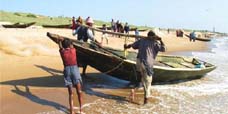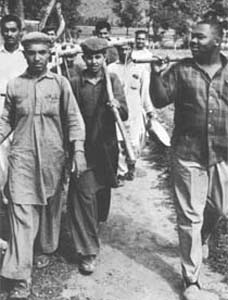
Tom Coyner first came to Korea decades ago as a Peace Corps volunteer, married a Korean woman, heads multiple community organizations and publishes a newsletter called the Korea Economic Reader.
Longtime expats finding a niche in selling advice to foreign firms
March 28, 2005 ? In nearly a decade of representing foreign businesses in Korea, Tom Coyner has, not surprisingly, amassed an anthology of success stories and cautionary tales. One of the latter involves his last employer, an American software company that lost its grip on the market because of a poorly managed relationship with its Korean distributors.
But as of last December, Mr. Coyner is no longer selling software ? he's selling that anthology. Soft Landing Korea Ltd., the market-entry and sales channel management consulting firm that he formed, draws upon his experience to try to answer a multibillion-dollar question: Why do certain foreign companies succeed in Korea, while others fail?
Mr. Coyner is one of a handful of expatriates who are marketing their knowledge of Korea to international companies with their sights on this market. As Korea specialists, they are niche providers. Within that niche, they are brokers, counselors, executors, interpreters, ombudsmen and matchmakers.
But perhaps the best metaphor is that used by Mr. Coyner, who describes them as parachutes to cushion a jolting, often bruising entrance into what literature for one consulting firm calls "one of the world's most difficult markets and unique cultural environments."
"We have seen expensive and foolhardy rushes into this market," Mr. Coyner writes on his Web site. "We have also seen foreign companies miss out on major and profitable opportunities out of fear and ignorance."
It hasn't been long that the idea of foreign business in Korea, historically a manufacturing base, has meant anything other than exports. Foreign direct investment is still rough terrain. But the support industry for foreign investors is even newer.
Many, if not most, companies opt to commission a research study rather than pay someone for advice.
Many are overconfident ("Well, it worked in Japan"). But Mr. Coyner maintains that reports, e-mails and telecommunication are not enough, and that "once you're here on location, you realize that there are another 20 questions that should be answered."
Earlier this month, Soft Landing Korea was approached by an Australian electronic payments software company that "recognized there was a pent-up demand for a next generation solution in Korea" but had neither "a local operation nor adequate understanding of doing business in Korea," Mr. Coyner says.
The first step for this company, as with many others eyeing this market, was to seek a partnership with a suitable Korean distributor for its products.
Taking charge of this recruiting process, Soft Landing organized facilities for the Australian company to introduce itself, present its credentials and demonstrate its products to potential Korean software distributors. The field of interested Korean companies was then narrowed down to the top two candidates via a follow-up questionnaire devised by Soft Landing, which then passed the results on to its client.
Mr. Coyner reports satisfaction on the part of the software company, which has since "committed to a long-term relationship with SLK to assist in their launch, localization and marketing of their products in Korea."
For affirmation that the demand exists for such guidance in the Korean market, one need look no further than Peter Underwood of IRC Limited in Seoul. As head of the firm's business consulting division, Mr. Underwood has seen its revenue increase tenfold since 1988 and plans to triple that in the next five years.
His job is to help foreign companies change Korean-staffed businesses from a hierarchical, relationship-based structure to a goal-oriented one. In the early years of foreign direct investment, he says, Western executives would tiptoe around anything proclaimed "the Korean way." But now ? "Well, we need the results," he says. "We're not the Peace Corps."
IRC's consulting services navigate foreign companies through the Korean market from the pre-entry stage through implementation and often beyond. Beginning with market research, feasibility studies and strategic planning, Mr. Underwood helps the company locate target sectors, competitors and/or partners, facilitates negotiations and handles permits and authorizations. From around the time of the 1997-98 financial crisis, the firm has also advised already-established Western-owned or -invested companies that have bought out a Korean company or are otherwise Korean-managed.
In meeting the various needs of investors in Korea, IRC and its peers emphasize one point: They are here to offer what others cannot. Advice as a commodity is a rather nebulous concept, but these firms have fleshed out their small arena in Korea by specializing.
Mr. Underwood rejects comparisons to international industry giants such as McKinsey & Co. and the Boston Consulting Group. "They came to Korea to service the jaebeol," he says, "but our client base is all foreign companies, and our focus is to make the Western company successful [here]."
Joe Day, president of Market Entry Services Co., a four-person consultancy firm for foreign companies entering Korea, similarly favors a narrow, well-defined scope.
With Nestle Korea, British American Tobacco, Yves Rocher (beauty products), and Aventis Pasteur (vaccines) among the firm's past clients, Mr. Day says it targets medium-sized, not blue-chip, companies.
"Korean investment numbers are boosted by very large mergers and acquisitions," he points out, "but I believe there's underdeveloped potential for mid-sized companies here." Though consulting services at law firms and the likes of McKinsey are technically available to these companies, Mr. Day asserts that "few are as specific as we are."
Likewise, Mr. Coyner has embraced the idea of specialization for his nascent firm, but based on sector rather than size. Unlike IRC, which handles industries as disparate as bananas and shipbuilding, and Market Entry Services, which has broadened its original intention of focusing on pharmaceutical and beauty products firms, Soft Landing specifically targets the high-tech sector. Among other advantages, this lowers the prospect of head-to-head competition with other consulting firms.
Because the best opportunities for these consulting firms lie outside the conglomerate bubble, many of the services they offer reflect the more practical, concrete needs of their mid-sized clients. These groups don't just draw up a plan, they implement it. Even IRC, which often handles Fortune 500 companies, is "very hands-on," according to Mr. Underwood.
Mr. Coyner says Soft Landing plans to be a "tactical implementer" rather than a strategist, continuing to support foreign firms after they first come here, through what he calls the "second, third and fourth steps" of successful entry into the Korean market.
Some of these firms also move beyond a strictly advisory role into a representative one. Market Entry Services, for example, has successfully provided "incubation" services for companies like Synthelabo (pharmaceuticals), I. Holland (engineering) and World Trades (publishing) in their initial stages of entry; these services allow one of the firm's own consultants to be trained in the product and hired as a temporary representative of the client company here.
For many small to medium-sized companies, Mr. Day says, commitments required in the incubation period can be a deterrent to investing in Korea. "This service provides a way to ease the costs of placing an executive here," he says.
For groups like Market Entry Services, Soft Landing and IRC, specialization applies to more than just their services; it also applies to the individuals who supply them. It's clear that even among expatriates in Korea, only a select pool is qualified to serve in this intermediary position, and this qualification presupposes a certain presence already established in the community.
For one thing, firms like these still rely primarily on word-of-mouth to attract business. This may explain why Mr. Coyner was discouraged by Soft Landing's inaugural months ? "it was a challenge to get the word out," he says. But with the visibility afforded by personal overseas travel, public appearances and publications, Mr. Coyner started getting clients referred to him last month.
This is an individual-driven industry, fueled by a group of people who are, as Mr. Underwood says, "embedded in Korea," independently of their jobs as consultants.
Mr. Coyner, for example, first came to Korea decades ago as a Peace Corps volunteer, married a Korean woman, heads multiple community organizations and publishes a newsletter called the Korea Economic Reader.
Mr. Day, who is British, has over 20 years' business experience in Korea, a Korean wife and family, and longtime membership on the boards of the British and EU chambers of commerce. And Mr. Underwood, a member of the famous missionary family, grew up here and is perfectly bilingual.
Perhaps it's because these men are Korea experts through their life experiences that they can understand the underpinnings of Korea's business culture, so inscrutable to foreign companies: its Confucian structure, the psychological impact of such rapid growth, and the ambivalent feelings of pride and insecurity.
They understand, for example, why having native Korean colleagues in their firms is a must, and why Korean companies would never hire them as principal advisers. Mr. Day understands why, when negotiating joint ventures, tensions often arise because medium-sized companies in Korea are owner-managed while representatives of foreign companies are almost always salaried employees.
Mr. Underwood knows how "Mr. Kim, we want to buy your company" can sound like "You're a failure and we'll take your job" to Korean executives. He also understands why Western assurances of "managing by the numbers" mean nothing to Koreans, for whom "numbers" have historically been used to minimize taxes rather than reflect company performance.
In short, says Mr. Underwood, "We can explain where Korea came from and the difference between how it works and how the West works."
by Kim Sun-jung <ebusiness@joongang.co.kr>














